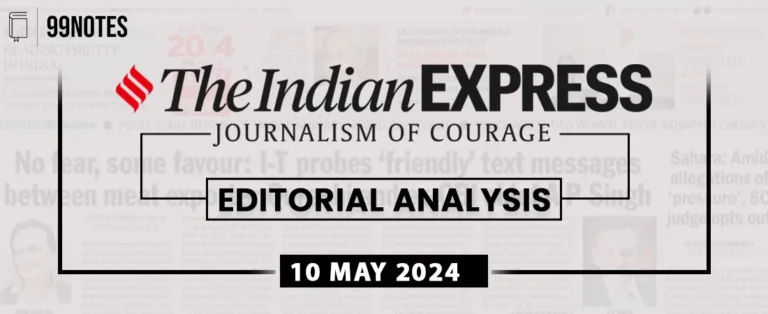7 November 2024 : Indian Express Editorial Analysis
1. Trump 2.0 and the world
(Source: Indian Express; Section: The Ideas Page; Page: 13)
| Context: |
| The article analyzes the potential domestic and global impacts of Donald Trump’s second presidential term, highlighting shifts in economic, social, environmental, and foreign policies. |
Election Outcome and Political Landscape
- In an unexpected turn of events, Donald Trump has won the U.S. presidential election, securing a significant mandate and solidifying Republican control in the legislative branch.
- Contrary to expectations, the election did not hinge on razor-thin margins, signaling a strong shift in public sentiment toward the Republican platform. Alongside this, Republicans gained seats in the Senate and maintained their majority in the House of Representatives, offering Trump an influential platform to enact his policies.
- With an already conservative majority in the U.S. Supreme Court, Trump’s second term could reinforce conservative influence across all branches of government.
Economic Agenda: Protectionism and Trade Tariffs
- Trump’s bold economic policies, particularly on trade, form a cornerstone of his agenda. His proposal to impose a 60% tariff on Chinese imports and a blanket 10-20% tariff on goods from other countries represents a significant pivot toward protectionism.
- These measures, aimed at reviving domestic manufacturing and addressing the middle-class frustration with rising costs, may have unintended consequences.
- Trade retaliation, particularly from China, appears likely, sparking concerns over a potential trade war that could exacerbate inflation and impact U.S. consumers.
- Questions remain about whether these policies will genuinely lower costs or inadvertently drive up prices, counteracting Trump’s pledge to ease the economic strain on Americans.
Social Policies: Immigration and Abortion
- Trump’s policies on immigration and abortion reflect his conservative, America-first stance. With immigration, he promises intensified border security, possibly including a revival of the southern border wall and large-scale deportations of undocumented immigrants.
- While resonant with his base, these plans raise practical and ethical concerns about feasibility and humanitarian impact.
- On abortion, Trump’s victory indicates a diminishing influence of the issue in mobilizing liberal voters, as evidenced by Kamala Harris’s limited appeal to women and younger voters.
- This outcome suggests a shift in voter priorities toward economic and national security issues over social causes.
Environmental Policy: Climate Change Reversal
- A second Trump presidency is likely to bring a stark reversal in U.S. climate policy, possibly including withdrawal from the Paris Agreement and a dismantling of climate-focused legislation like the Inflation Reduction Act.
- Trump has voiced support for the expansion of oil and gas exploration, including in ecologically sensitive areas.
- With the U.S. shifting away from climate commitments, global efforts to mitigate climate change could suffer a significant setback, weakening momentum and coordination among other nations and potentially worsening environmental crises.
Foreign Policy: Middle East, Europe, and the Indo-Pacific
- Under Trump, U.S. foreign policy will likely see reinforced support for Israel, with potentially increased military aid and diplomatic backing for Prime Minister Netanyahu’s government.
- In contrast, Trump’s apparent reluctance to support Ukraine against Russia may strain relations with European allies and embolden Russia. His historical disdain for NATO could further unsettle Europe’s security landscape, particularly if he pursues trade tariffs against European imports.
- In Asia, Trump’s foreign policy is expected to prioritize containment of China, likely strengthening alliances through the Quad (U.S., India, Japan, and Australia) to counterbalance Chinese influence.
U.S.-India Relations: Strategic Partnerships and Economic Concerns
- India is expected to navigate a Trump presidency more comfortably than many U.S. allies, given Trump’s transactional approach and ideological alignment with Prime Minister Narendra Modi. U.S.-India relations are likely to benefit from a continued emphasis on defense, technology, and trade partnerships, with Trump less inclined to critique India on human rights.
- However, Trump’s anti-immigration stance could complicate matters, particularly with Indian immigrants in the U.S. and the growing trend of illegal immigration. His economic policies may also affect India’s exports and economic stability, requiring careful diplomatic maneuvering.
Conclusion: A New Era of Global Uncertainty
- Donald Trump’s return to the White House portends a dramatic shift in the U.S. domestic and global policy landscape, marked by an assertive economic agenda, significant social policy changes, and a repositioned U.S. stance on international relations.
- While some allies, such as Israel, may welcome Trump’s policies, others may brace for increased uncertainty and economic volatility.
- India, with a strategic interest in U.S. alignment, will watch closely as Trump’s policy team takes shape, preparing for potential disruptions in both trade and diplomatic channels.
- In the meantime, the world awaits Trump’s new administration with cautious anticipation, bracing for the geopolitical shifts that may lie ahead.
| Implications and Imperatives for India |
|
Defence and Security: There is strong convergence between U.S. need for capable partners and India’s great power ambitions. There is an opportunity to deepen defence ties, co-development, intelligence sharing, interoperability with the U.S. and its allies. Issue with respect to Tariffs: On the economic front, India faces challenges given Trump’s views on India’s tariff levels and past failure to reach a trade deal. Trump called India the “tariff king” and ended India’s preferential trade status under the GSP program. Trade and Technology Partner: For India, the U.S. is one its most promising trade and technology partners so it cannot afford a breakdown in economic relations. Sectors like services trade, high-tech, startups, renewable energy, education seeing growing two-way engagement. |
| Practice Question: Discuss the potential implications of Donald Trump’s second presidential term on global geopolitical stability, environmental commitments, and foreign relations. How might these changes affect key U.S. allies and global power dynamics? (250 words/15 m) |




